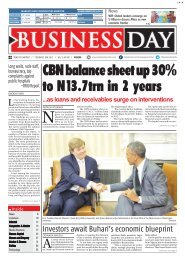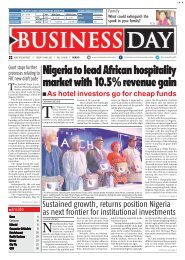Create successful ePaper yourself
Turn your PDF publications into a flip-book with our unique Google optimized e-Paper software.
26 THISDAY • WEDNESDAY, MAY 20, 2015<br />
BUSINESSWORLD<br />
INTERVIEW<br />
Chukwu: Investors Are Not Yet Clear<br />
about Incoming Govt’s Policy Direction<br />
Managing Director/Chief Executive Officer, Cowry Asset Management Limited,<br />
Mr. Johnson Chukwu, told Obinna Chima that the volatility in the stock market<br />
may persist until the incoming government comes out with a clear economic policy<br />
that investors can relate with. Excerpts<br />
A lot of experts have been advising the<br />
incoming government to focus majorly on<br />
raising Nigeria’s non-oil revenue, whose<br />
component is also taxation. Don’t you think<br />
there would be a backlash from Nigerians if<br />
the tax rates are increased without a commensurate<br />
increase in their level of income?<br />
When you talk of non-oil revenue, there are<br />
several other areas beyond tax. We also have<br />
Customs duties, which also accounts for a large<br />
portion of the non-oil revenue. The Minister of<br />
Finance and the Coordinator of the Economy<br />
said recently that there are lots of leakages with<br />
duty waivers and if we focus more on that, we<br />
are going to have an increase in the level of<br />
revenue government gets from Customs. But by<br />
focusing on tax, what the government would be<br />
looking at, would not be to increase tax rates,<br />
but rather to increase the coverage. Today, 95<br />
per cent of people who pay taxes in Nigeria are<br />
civil servants and those who work in established<br />
institutions. That is, those who pay under the<br />
Pay-As-You-Earn (PAYE) system. But the selfemployed<br />
people, a lot of them are significantly<br />
richer or earn more income than those in paid<br />
employment, but they hardly pay taxes. So, I<br />
think the emphasis should be on how to bring<br />
in, into the tax drag net, non-salaried workers<br />
who have reasonable level of income or even<br />
those who have low income. There is what is<br />
called minimum tax. So, everybody that is taxable<br />
should be subject to tax. I am sure that if you<br />
bring in the self-employed persons, you may find<br />
out that the tax revenue will more than double,<br />
that is on the PAYE. Then on the tax that is<br />
collected by the Federal Inland Revenue Service<br />
(FIRS), you are looking at company income tax<br />
and if you look at its level of enforcement, it is<br />
also very weak and so, we need to strengthen<br />
corporate governance standards. That is why I<br />
am happy with what the Financial Reporting<br />
Council (FRC) is trying to do. Companies should<br />
render their annual returns to the Corporate Affairs<br />
Commission (CAC) and based on that and the<br />
report they also tender to the FRC, they should be<br />
subject to tax. So, if all the registered companies<br />
in the country pay corporate tax, the federal<br />
government’s revenue would have significantly<br />
increased. So, the increase in non-oil revenue that<br />
is being emphasised now does not necessarily<br />
mean increasing the tax rate, but rather, expanding<br />
the tax drag net.<br />
But do you think it will be easy for the<br />
federal government to get the self-employed<br />
to pay tax?<br />
There is what is called self-assessment. Irrespective<br />
of whether a person is self-employed or not,<br />
every adult citizen should be made to complete<br />
a self-assessment form. The self-assessment form<br />
should indicate whether a person gets dividend<br />
income, allowance from a board sitting, and profit<br />
from an unincorporated businesses, etc. So by<br />
the time you complete the self-assessment form,<br />
every individual would have a taxable income.<br />
So, once you fill your tax returns, you should<br />
also make your tax payment.<br />
The draft document of the harmonised<br />
code of corporate governance that the FRC<br />
released recently has continued to generate<br />
a lot of debate. What in your opinion do you<br />
think is wrong with the idea to harmonise<br />
the various codes of corporate governance<br />
we have in the country?<br />
Well, I think what the FRC set out to achieve<br />
was to protect the interest of minority shareholders.<br />
That is the primary objective it wants to achieve.<br />
I also know that it would bring about a higher<br />
level of corporate governance standards and high<br />
level of transparency in corporate governance.<br />
But the hue and cry is because market operators<br />
feel that the unified draft corporate governance<br />
Chukwu<br />
standards would over regulate the economic<br />
space and businesses and might stifle creativity<br />
and industrial growth. They are also afraid that<br />
the objective of growing enterprises may also be<br />
defeated. You need to harmonise the objectives<br />
of the corporate entity with the objectives of the<br />
individuals. For instance, if you take the issue of<br />
board composition, you have one-third of board<br />
members being constituted by non-interest bearing<br />
shareholders, that is, shareholders who have<br />
no interest in the business, which is what you<br />
call independent shareholders. The independent<br />
shareholders’ lack of interest in the business may<br />
make them not to be as committed in driving<br />
the growth of the business. And when the key<br />
stakeholders bring up policies that would drive<br />
the growth of the company, he might be frustrated<br />
by the large number of independent shareholders<br />
who are only risk averse and have no personal<br />
interest in the prosperity and growth of that<br />
entity. So, I think having people who have no<br />
interest, whatsoever in a company dominating<br />
and having undue influence over the affairs of<br />
the company may not allow for economic growth.<br />
So are you suggesting that, that aspect<br />
of the proposed harmonise code should be<br />
reviewed?<br />
Yes, the unified corporate governance regulation<br />
they want to bring out should be reviewed. They<br />
need to look at several segments that market<br />
operators are complaining of such as the issue of<br />
the rotation of external auditors. The frequency<br />
of that rotation is also too regular and operators<br />
are saying that might not allow the external<br />
auditors to have a deep understanding of the<br />
operational activities of such companies as to<br />
carry out thorough audit. So, these are some of<br />
the reasons why operators are saying the FRC<br />
should allow that exposure draft to stay longer<br />
and set up meetings with interest groups so that<br />
they can synthesise these complaints and see<br />
how they can modify the guideline to achieve<br />
the primary objective of protecting minority<br />
interest without compromising economic growth.<br />
The stock market has been volatile this<br />
year, what do you think should be done to<br />
attract investors to the market?<br />
If you look at what has happened in the<br />
market this year, you have to situate it within<br />
the general political environment. So far, this year<br />
has been dominated by political activities. We saw<br />
a presidential election where there was heightened<br />
political tension about the future corporate existence<br />
of the country. So, it wasn’t a time for people to<br />
be very aggressive in terms of investments in<br />
any instrument, including stocks. Subsequently,<br />
we were lucky we had a president that conceded<br />
defeat and that stabilised the polity. But you now<br />
have policy uncertainty. Investors are not clear<br />
about what would be the policy direction of the<br />
incoming government and that is why the level<br />
bids in the market has been weak. You have seen<br />
the market move relatively southward over the<br />
last couple of days and I think that would persist<br />
until the inauguration of the new government<br />
and even after the inauguration, until they come<br />
out with a clear economic policy that investors<br />
can relate with.<br />
But don’t you think the retail investors<br />
should be encouraged to come back to the<br />
market?<br />
Well, a lot of factors have to be looked at. Firstly,<br />
you need to look at why the retail investors are<br />
no longer active in the market and the reason is<br />
that they lost a lot of money in 2008 and 2009<br />
and a lot of them have not recovered from those<br />
losses. Secondly, there is no available credit to retail<br />
investors. So, any retail investor that wants to play<br />
in the market will play with his own equity and<br />
that equity is highly limited. The third factor is<br />
that we have seen long periods of contractionary<br />
monetary policy with the central bank driving<br />
up interest rate and making investments in<br />
fixed income instruments more attractive that<br />
investing in equities. A situation whereby you<br />
can put your money and earn 13 to 15 per cent<br />
on fixed income instruments will discourage you<br />
from playing in the equities market where you<br />
are not certain of the return. These factors have<br />
contributed to keeping away retail investors from<br />
the market. But having said that, I believe after<br />
the transition has taken place and we have a<br />
clear economic policy direction and government<br />
drives some level of financial stimulus to the<br />
economy, in form of quantitative easing or even<br />
increasing the liquidity available to the banks,<br />
so that interest rate would come down and they<br />
also need to relax the stringent conditions under<br />
which banks can lend for investment in equities.<br />
If these things are done, we should see the retail<br />
investors coming into the market.<br />
With the current situation in the economy,<br />
do you think the central bank would be<br />
willing to relax monetary policy?<br />
I always say that economic management issue<br />
is a balancing act. What I mean by balancing<br />
act is that you cannot achieve everything at the<br />
same time, something has to give in. So, if our<br />
priority today is to grow the economy, we need<br />
to lower interest rate and reduce the cash reserve<br />
ratio on public and private sector deposits, so<br />
that banks would have more liquidity. Given<br />
the depth of investable instruments, rates would<br />
come down and economic activities would pick<br />
up because companies and individuals need<br />
funding to engage in economic activities. But<br />
because the cost of funds is so high, a lot of<br />
people cannot borrow to engage in economic<br />
activities. We are aware that this would lead<br />
to some level of inflation, which was why I<br />
said managing an economy is a balancing act.<br />
So, we may need to accept that increased level<br />
of inflation as a cost of stimulating economic<br />
growth. If you look at a country like Brazil, at<br />
the height of their hyperinflation, the inflation<br />
rate was more than 1,000 per cent, but they were<br />
also growing the economy. Today, Brazil is one<br />
of the top economies in the world, but it had a<br />
heady growth and they had to accept inflation<br />
as the cost of that economic growth.<br />
The central bank and the commercial<br />
banks have set a deadline for those they<br />
termed chronic debtors to repay their debt.<br />
Do you think it was a good initiative by<br />
the bankers?<br />
Well, it is good that we have a way of enforcing<br />
collection and contracts. But whether the name<br />
and shame is the appropriate thing to do is what<br />
I don’t think. But I think what the central bank<br />
should is to work with the Ministry of Justice<br />
to strengthen the legal system. Foreclosure law<br />
should be in place, create commercial courts<br />
where these cases are judiciously treated. But I<br />
don’t think name and shame would be a lasting<br />
solution to addressing the issue of recalcitrant<br />
debtors. We need to go further than that. Those<br />
collaterals involved should be foreclosed. Even<br />
if you name and shame a person who had no<br />
shame in the first place and he still retains the<br />
funds he borrowed from the bank, what value<br />
have you created? So, we need to have ways of<br />
compelling people to pay their debts.<br />
What are your expectations from the<br />
new director general of the Securities and<br />
Exchange Commission?<br />
The good thing about SEC is that there is already<br />
a roadmap for the development of the Nigerian<br />
capital market and i expect him to implement<br />
it. He has operated from both sides of the coin.<br />
He had been a regulator and went back as an<br />
operator and came back as a regulator. So, it<br />
is easy for him to understand the dynamics of<br />
the market. So, we need to drive growth of the<br />
market, we need to deepen the market, we need to<br />
bring more classes of products into the market. We<br />
also need to have the key sectors of the economy<br />
listed in the market. Today, why the market does<br />
not reflect economic activities is because the sectors<br />
that drive the economy are not listed on the stock<br />
exchange. Take for instance, telecoms, it is about<br />
nine per cent of the GDP, but no telecoms company<br />
is listed on the stock exchange. Starcomms has<br />
already delisted. Also, look at the agricultural sector<br />
that has about 25 per cent of the GDP, apart from<br />
Okomu Oil and Presco that are listed. Look at the<br />
upstream oil and gas sector, apart from Seplat,<br />
there is no other upstream sector operator that is<br />
listed. So, the key thing is to encourage those sectors<br />
that account for a greater share of our economic<br />
activities to become listed. I think that should be<br />
some of the priority areas of focus for the new<br />
SEC director general.
















